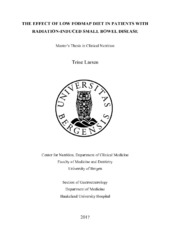The effect of low FODMAP diet in patients with radiation-induced small bowel disease
Master thesis
Permanent lenke
https://hdl.handle.net/1956/15874Utgivelsesdato
2017-05-09Metadata
Vis full innførselSamlinger
Sammendrag
Rationale: Patients suffering from chronic radiation-induced small bowel disease (RISBD) after cancer treatment have similar symptoms as patients with IBS (irritable bowel syndrome), despite dissimilar pathological origin. The low FODMAP (fermentable oligo-, di-, monosaccharides and polyols) diet (LFD) is a widespread management strategy for IBS. The aim of the conducted study was to investigate the effects of LFD on symptoms and health related quality of life (HRQOL) for patients with chronic RISBD. Methods: In an open pilot study, 11 patients with RISBD related IBS symptoms were instructed to follow LFD throughout a 4-week intervention period. IBS Severity Scoring System (IBS-SSS) and IBS Symptom Questionnaire (IBS-SQ) were used to assess symptoms. An Ad hoc questionnaire measured grade of damage and typical RISBD complaints. Short Form Nepean Dyspepsia Index (SF-NDI) and 12-item Short Form Health Survey (SF-12) were used to evaluate HRQOL. A 3-day food record was used to estimate baseline intake of FODMAPs, to reveal dietary changes and to assess adherence to the diet. All schemes were completed at baseline and at 4 weeks. Results: FODMAP intake was successfully reduced, and main additional changes in the diet were reduced intake of energy, carbohydrates and fiber. The adherence to the diet was high (mean 94.8%). IBS symptoms improved significantly based on mean total score of IBS-SSS and IBS-SQ, which changed from 310.2±60.7 to 171.4±107.2 (p=0.001) and 27.4±4.1 to 15.7±10.1 (p=0.002), respectively. The severity of abdominal pain, abdominal distension, belching/flatulence, constipation, diarrhea, early satiety, dissatisfaction with bowel habits and interference with life in general, improved significantly. Tendencies of improvement were also measured in comorbidity complaints and typical RISBD complaints. HRQOL improved based on SF-NDI total score, which changed from 30.5±9.4 to 18.3±8.2 (p=0.001) and based on mental (p=0.047) and physical (p=0.134) component summary score of SF-12. Conclusions: The low FODMAP diet seems effective in alleviating IBS symptoms, and improving HRQOL in patients with RISBD. High compliance to LFD is possible with adequate diet counseling and continuous guidance. Further controlled studies with larger sample size should be conducted to verify our results and hopefully enable the implementation of LFD as a future management strategy for chronic RISBD.
